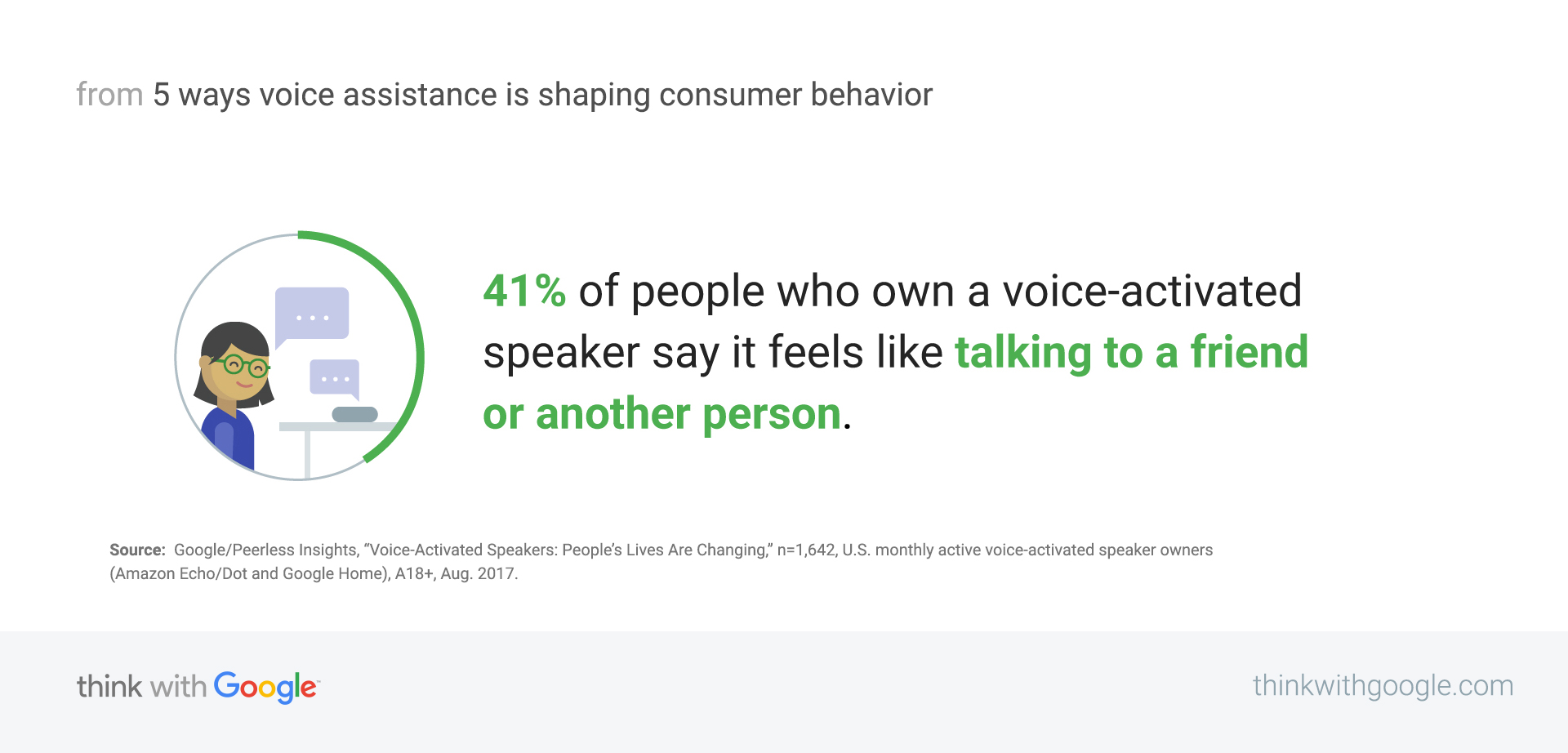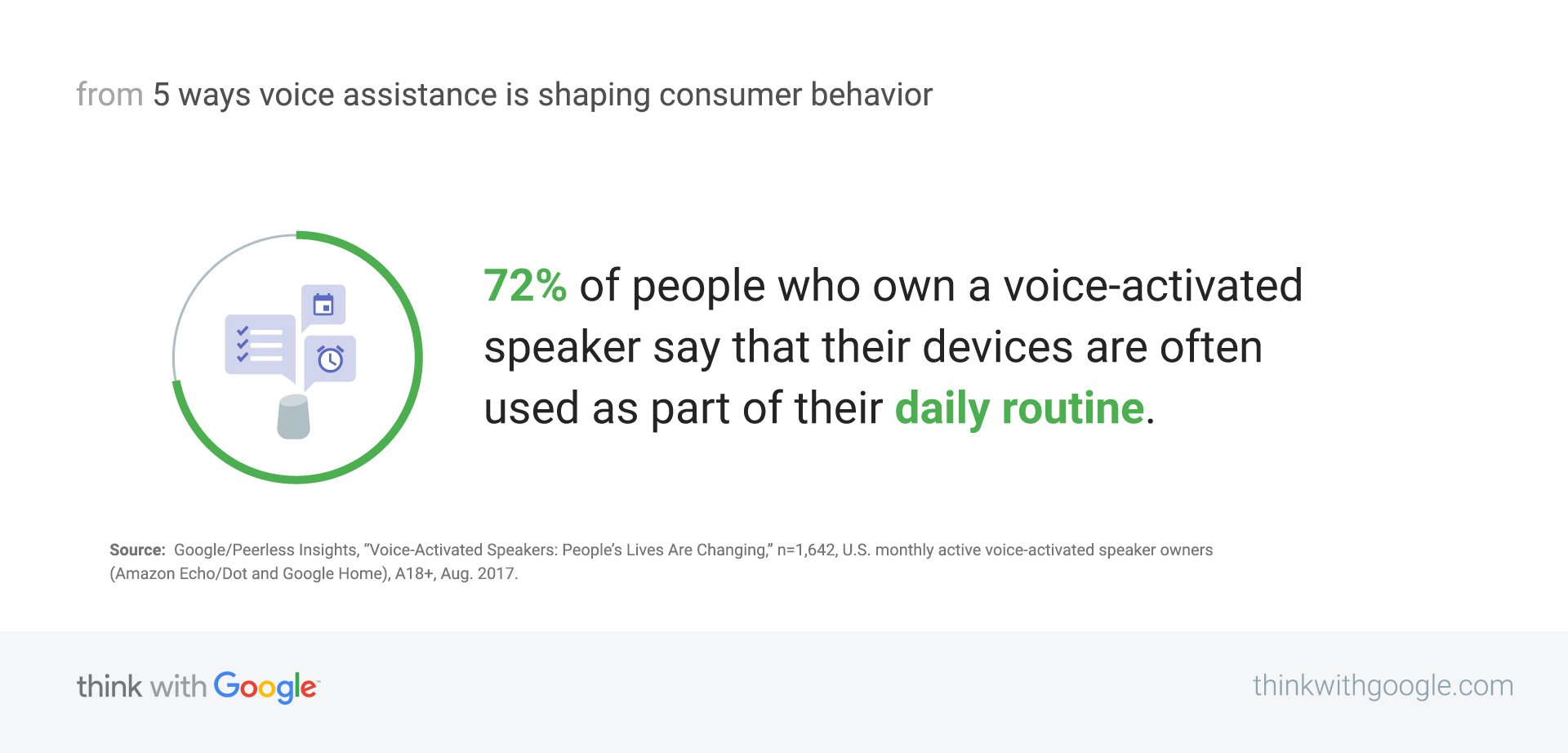The Rise of Voice Search
Voice Search SEO
A very common SEO prediction for 2018 has been the increase in voice search. This is directly linked to the improvements in technology and the prevalence of smart technology devices. The most current and most common embodiment of this is the smart speaker. These speakers are activated by voice, and provide searchers answers as a spoken results. Users are getting more, and more used to interacting with search engine results using only their voices and their ears. This type of search is already drastically changing the types of queries used, and it will change the way businesses approach search marketing.
On the Shoulders of Giants
Tech giants, like Google and Amazon, are pouring massive resources into smart devices, or digital assistants if you like. In Amazon’s Q3 2017 report it claims tens of millions of customers have now purchased Alexa devices. This starts to give us a frame of reference for just how many people are currently using voice search via their digital assistants. The growth of voice isn’t just about search. It’s also about the use of voice to do everyday things like, play music or shop. Companies such as Walmart and Google are forming partnerships on voice-based shopping. Voice Search is Here to Stay Yearly we’ve seen the rise of voice and the proliferation of devices that use voice. Voice has far-reaching business impacts, from retailers to search marketing companies. Companies that want to succeed in search marketing (who doesn’t) will have to adapt their web presence to meet this change in consumer behavior.
The Numbers Still not sure how this might be relevant to you? Here are some statistics that might help to illuminate what the future will look like.
- comScore - 50% of all searches will be voice searches by 2020
- Google - Google Assistant is now available on more than 400 million devices
Some of these statistics are also revealing in terms of how the consumer mindset is changing towards voice search. 
 There are many, many more statistics about voice search, voice devices and voice commerce — just ask Google.
There are many, many more statistics about voice search, voice devices and voice commerce — just ask Google.
What are the Repercussions of the Voice Revolution?
Voice technology and smart devices are going to become even more advanced and more popular — this will spark a full-on voice search revolution. What would that look like in the world of search? Audio-only UI. Smart technology is getting users accustomed to discovering information, making purchases, and interacting with websites with just their voice. It’s possible that the value of visual platforms, including the traditional website will need to evolve. It’s likely that you’ll have to rethink how to present information to audiences. More local results. Voice searches naturally have a local intention — think ‘near me'. Users are also getting reliant on voice search on-the-go. This shift will drive an uptick in the percentage of locally-focused queries, and will likely change the emphasis Google places on local results. More complex queries. Search queries are getting more complex. Searchers don’t need to put much forethought into the keywords they use. As long as a person asks a question that’s remotely intelligent, the searcher will receive a suitable selection of search results. We have Google RankBrain to thank for this. RankBrain, and other algorithm updates, specialize in “understanding” complex user queries and condensing them to something that’s easier for the search engine to search it’s index on. The traditional approach to targeting keywords is going to need to change. Longer, more complex keyword queries and targeting overall topics, rather than specific terms will become the approach.
How to Prepare for the Voice Search Revolution
Here are some practical steps you can be taking now. Audit your current strategy. Scrutinize your current search marketing strategy. Are you giving any attention to voice queries? A step in the right direction is to expand your current target keywords to include long-tail keyword phrases.
- Analyze your keyword strategy. Look at how many of your targets are head keywords, like ‘infrastructure performance’. Are you including long-tail keywords, like ‘effectively managing a training portal’? Are you including general topic targets?
- Look at SEO tactics like structured data. Structured data markup can be implemented for a range of topics and page elements. Schema markup is better for SEO and it is ideal for optimizing content for voices search.
- Put more resources on claiming the top spots for a handful of key SERPs, and stop going for keywords that aren’t important to your business.
- If you’re local, focus on local. If you’re business goals are not local then this probably doesn’t matter, but if you aren’t investing in local SEO, this is a good time to start.
In Conclusion
Very few SEO changes upset the search marketing landscape overnight. Making incremental adjustments, like adapting your keyword strategy, is safe. Don’t delay though — prepare for more changes in the near future. At the end of the day we don’t know exactly how the voice search revolution will impact search marketing. Flexibility is the key. The future of voice search is unknown, but you can look forward to the new ways customers will engage with your digital experience.
Main Photo by Jason Rosewell on Unsplash




